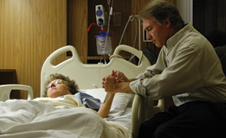Lying to the Doctor
| November 10, 2014

One of the cardinal rules for patients is, "Thou shalt not lie to the doctor."
But people do it anyway, and deception seems to be more prevalent than most of us might think. Software Advice, a practice management systems consultancy, recently surveyed 3,075 patients and learned that half of them have deliberately withheld information from a doctor or other health care professional at least some of the time.
The percentage is probably even higher if we include unintentional withholding of information – the details that patients omit because they think it's unrelated or not worth mentioning.
The survey respondents were most likely to be untruthful about drug, alcohol and tobacco use. Other areas prone to deception included eating habits, sexual activity, current medications and use of complementary and alternative therapies.
That wasn't all, though. Almost 40 percent of those who took the survey admitted to minimizing their symptoms, their current or past medical history, or their health-related behavior. About one-fourth deceived by exaggerating, and another one in four said there were times when they didn't disclose the information at all.
Why are patients sometimes less than forthcoming? The top reason, according to the survey, was fear of being lectured or feeling embarrassed. Patients also feared a loss of privacy if they disclosed something sensitive. And some of the time they simply wanted to avoid the cost or inconvenience of treatment.
The survey participants said they were more likely to be prodded into honesty if they had assurance that the information they disclose would be kept confidential. Knowing that the doctor or nurse wouldn't judge them also was important.
It also seemed to help when patients had more information about the consequences of dishonesty – for example, the possibility of a misdiagnosis or harmful drug interaction. In addition, patients wanted assurance that they would be helped, and a small minority felt they would be more truthful if the doctor gently confronted them over a perceived lie.
There's plenty of research to confirm that patients aren't always forthcoming. For instance, a poll conducted a couple of years ago by Legacy, a national public health organization, found that one in 10 people didn't disclose their tobacco use – and that the more stigmatized they felt, the less likely they were to tell the doctor or nurse that they smoked. Another study found that patients often don't self-report symptoms of depression.
Most doctors are familiar with patients' tendency to sometimes sand off the truth. A popular rule of thumb that many doctors learn during their training is to automatically double the amount of alcohol that patients say they consume; someone who reports having two drinks a day is really having four drinks a day.
Not all patients lie, however, and a handful of studies suggest that doctors may overestimate how often this happens. For that matter, doctors aren't always truthful with patients either – but that's a topic for another day.
Dishonesty in the doctor-patient relationship, even if the patient thinks it's just a little white lie, rarely serves the patient's best interests. At best, a health problem that's minimized or not reported at all won't get better. In the worst-case scenario, patients can end up being harmed because of inaccurate or incomplete information.
The easy answer would be to tell patients to get over their fears and embarrassment and just tell the truth. But count on it, for many people this isn't enough. The survey by Software Advice concluded that if doctors want their patients to be honest, they need to make an effort of their own to create a trusting, non-threatening environment that encourages patients to open up: "Asking informed follow-up questions, maintaining eye contact, avoiding lecturing and clearly explaining confidentiality laws can go a long way towards improving communication and trust with patients."
This post originally appeared on Anne Polta's HealthBeat blog on October 6, 2014.










